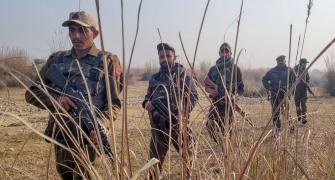Japanese Prime Minister Shinzo Abe, who addressed a joint session of Parliament on Wednesday, quoted widely the writings of Swami Vivekananda and Mughal scion Dara Shikoh and referred to Emperor Ashoka, Mahatma Gandhi, Jawaharlal Nehru reflecting the close ties between the two countries.
Abe recalled the honour the then prime minister Jawaharlal Nehru accorded to his grandfather Nobusuke Kishi, the first Japanese premier to visit India, 50 years ago by organising a grand civic reception for him.
"As the leader of a defeated nation in a war, he (Kishi) must have been delighted," Abe said in his 20-minute speech at the joint session attended by Vice-President Hamid Ansari, Prime Minister Manmohan Singh, Lok Sabha Speaker Somnath Chatterjee and several Parliamentarians and diplomats.
The visiting dignitary noted that India was the first country to accept the Overseas Development Assistance from war-torn Japan, which wanted to provide it as a matter of honour.
"My grandfather never forgot that fact either," he recalled.
He remembered the gift of four elephants over the years from India -- the first donated by Nehru named after his daughter Indira and the latest being Surya in May 2001.
"Surya arrived in Japan in May 2001, just as Japan was struggling to wrest itself from a grinding recession. Surya was our reminder that the sun will indeed rise again," said Abe, who had titled his speech 'Confluence of the Two Seas' after a book authored by Mughal Prince Dara Shikoh, the eldest son of Emperor Shahjahan.
Abe quoted the writings of Vivekananda, who guided Tenshin Okakura, a Renaissance man of early modern Japan.
"Okakura was guided by Vivekananda and also enjoyed a friendship with Sister Nivedita, Vivekananda's loyal disciple and a distinguished social reformer. Spirit of tolerance is one of the many contributions that India can make to the world history," Abe said.
"Help and not fight, assimilation and not destruction, harmony and peace and not dissension," Abe quoted from Vivekananda's 1893 speech at Chicago and said that they now hold the tone that is even more compelling than before.
"From the reign of Ashoka the Great to Mahatma Gandhi's satyagraha movement of non-violent resistance, the Japanese people are well aware of the unbroken spirit of tolerance in Indian spiritual history," the premier said.
Abe said he would also visit Prashanto Pal, the son of Justice Radhabinod Pal who is respected by many Japanese for the noble spirit of courage he exhibited during the International Military Tribunal for the Far East.
Abe recalled freedom fighter Subhash Chandra Bose and poet laureate Rabindranath Tagore who were engaged in at the deepest level of their soul with their Japanese contemporaries.
"Indeed, the depth and the richness of the exchanges that the intellectual leaders of Japan and India enjoyed during the early modern age are in some ways beyond what we in the modern day can imagine," Abe said.







